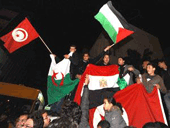Yemen: CSOs call the world to stop the massacre
Published on Tue, 2011-05-31 07:57
Sources: FIDH, HRITC , http://bit.ly/k49r4A The Human Rights Information & Training Cente (HRITC, national focal point of Social Watch) warned in a communiqué also signed by the International Federation for Human Rights (FIDH) and the Sisters' Arab Forum for Human Rights (SAF) about the risk of civil war in Yemen. This organisations also reported the death of at least 34 people in combats that took place between May 22nd and 14th. Armed clashes have erupted in the Yemeni capital, Sana’a, between the army and followers of the tribal leader Sheikh Sadeq al-Ahmar, who joined the anti-government protests a few weeks ago, said the civil organisations in the document lauched last week. Between May 22 and 24, the clashes allegedly led to the death of at least 34 people including tribesmen, soldiers and civilians. The combat zone is densely populated and completely closed off. Rescue teams are prevented from reaching the wounded, including civilians. According to witnesses, the fighting erupted on May 24 in the heart of Sana’a with heavy gunfire. Armed clashes escalated the day after the Yemeni President Ali Abdallah Saleh warned about the threat of a civil war in his speech announcing his refusal to sign the political agreement initiated by the Gulf Cooperation Council. The armed conflict broke out when the security forces transformed a school adjacent to the house of Sheikh Abdallah Al-Ahmar in Sana’a into a military site. According to the Office of the Sheikh, followers of this tribal leader protested against these dealings, and the soldiers answered the protests opening fire on the protesters. In addition to these deadly clashes, Sanaa was again the scene of other episodes of repression and violence over the past couple of days against demonstrators and civilians identified as anti-government protesters. Peaceful and popular protests demanding reforms are still taking place in several cities across Yemen even if protesters face ongoing harsh repression by the Yemeni security forces and members of the army. Taiz City has gone through the most severe attack by the Yemeni authorities on Sunday 29, according to the HRITC. Lots of soldiers with machine guns and bombs attacked the Freedom Square in Taiz. Lots of protesters were crashed. The tents where they were accommodated were burnt with women, old aged people and young people inside. HRITC said this is a “conspiracy” planned by “cruel security and army forces”. No less than twenty young people were killed and hundreds were injured, it reported. “The world has seen on TV and on websites that the army and security forces attacked was without any justification, and that it was very violent and expressed a state of hysteric revenge,” added the organisation. The Yemeni organisation called “all living forces in the world and firstly the Security Council and the Secretary General of the United Nations as well as the European Union not to keep watching the biggest real massacre committed by the Yemeni Authorities against the young people in Taiz”, because “this crime against humanity requires a quick step from the neighboring countries and countries of the world”. Between May 22 and 24, the clashes allegedly led to the death of at least 34 people including tribesmen, soldiers and civilians. The combat zone is densely populated and completely closed off. Rescue teams are prevented from reaching the wounded, including civilians. According to witnesses, the fighting erupted on May 24 in the heart of Sana’a with heavy gunfire. FIDH, HRITC and SAF expressed their concern regarding the escalation of violence in Yemen. The organisations are particularly worried since they have also been informed about the distribution of arms to civilians in several parts of the country, by representatives of the authorities arguing the threat of a civil war over the past days. They urge all parties to refrain from using violence and to guarantee the protection of civilians. These developments demonstrate the inability of the international community, notably under the authority of the Gulf Cooperation Council, to prevent the increase in violence, according to the organisations. FIDH, HRITC and SAF called upon the United Nations Human Rights Council, in session from Monday May 30th, to respond to the escalating violence in application of its protection mandate. Listen to Ezzedine El-Asbahi, President of the HRITC, in Arabic and in mp3 format.
|
SUSCRIBE TO OUR NEWSLETTER



